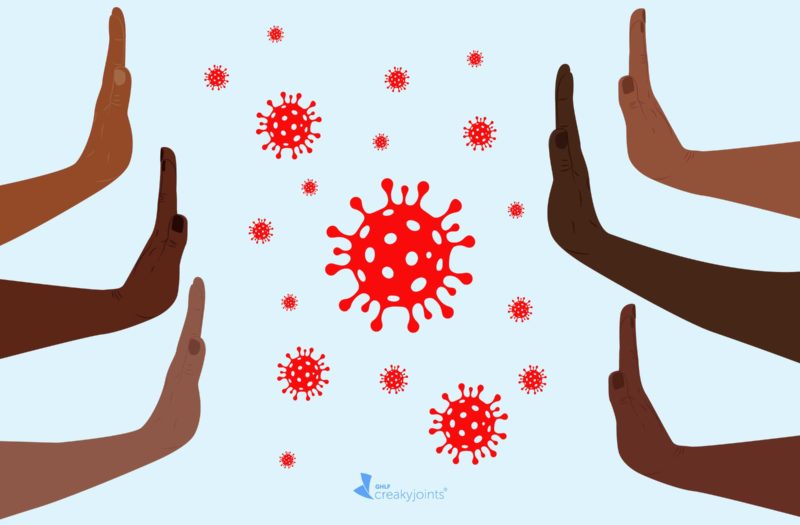Learn more about our FREE COVID-19 Patient Support Program for chronic illness patients and their loved ones.
In the months since COVID-19 began to sweep the globe, researchers have learned a lot about who’s most likely to be in danger if they become infected.
We now know that people over age 65 are significantly more likely than younger people to become severely ill, for example.
A number of underlying conditions — including type 2 diabetes, heart disease, chronic obstructive pulmonary disease (COPD), kidney disease, obesity, sickle cell disease, and being an organ transplant recipient — also raise the risk of severe complications.
Research is still ongoing about how people with rheumatic conditions, such as rheumatoid arthritis or lupus, may be affected, and CreakyJoints is watching this data closely.
Rheumatic Disease Racial and Ethnic Disparities in COVID-19
But another thing that also become an important area of focus is racial and ethnic disparities in COVID-19. Researchers have been finding that people in racial and ethnic minority groups are contracting coronavirus and becoming extremely ill from it at disproportionately high rates.
This alarming association also appears to hold true when it comes to people with rheumatic conditions.
Recent research presented at ACR Convergence 2020, the annual meeting of the American College of Rheumatology, found that Black, Hispanic/Latinx, and mixed/other race groups with rheumatic disease were more likely than white rheumatic disease patients to become infected with COVID-19 and become severely ill from it.
A Greater Risk of Hospitalization and Complications
The study, led by rheumatologist Milena Gianfrancesco, PhD, MPH, Assistant Professor of Medicine at the University of California, San Francisco School of Medicine, used information from the ongoing COVID-19 Global Rheumatology Alliance, an international registry of data submitted by rheumatologists.
This particular study aimed to tease out the relationship “between race/ethnicity and COVID-19 hospitalization, ventilation status, and mortality in people with rheumatic disease using data from the largest case series to date.”
The group initially submitted research that focused on 694 people with various rheumatic diseases, but was later able to analyze a larger sample size of more than 1,000 patients. This included people with:
- Rheumatoid arthritis
- Systemic lupus erythematosus
- Psoriatic arthritis
- Axial spondyloarthritis
- Other rheumatic conditions
Dr. Gianfrancesco will present the larger version of the study during a poster session on November 6.
No significant differences in COVID-19 deaths were found between racial/ethnic groups. But Black, Hispanic/Latinx, and mixed/other race groups of people with rheumatic disease who contracted COVID-19 were significantly more likely to be hospitalized.
Black, Hispanic/Latinx, and mixed/other race rheumatology patients had two to three times higher odds of hospitalization compared to white rheumatic disease patients.
Among those who were hospitalized, Hispanic/Latinx patients also had increased odds of being put on a ventilator compared to white patients.
“These disparities may be due to several factors: access to testing, access to care, and living and working environments,” Dr. Gianfrancesco tells CreakyJoints. She added that these patient populations are also “more likely to hold public-facing roles or other essential occupations [and live] in densely populated homes.”
“It is likely that the disparities we witness in COVID-19 outcomes reflect pre-existing underlying health disparities in our population,” she says.
Dr. Gianfrancesco says that rheumatologists, public health experts, and the community at large should aim to address these disparities. Proactive steps might include “creating informational materials in multiple languages about the risks of COVID-19 and precautions that should be taken, [as well as] encouraging targeted testing for high-risk patients and communities.”
The Environmental Influence
Another study, led by rheumatologist Ashira Blazer, MD, Assistant Professor at NYU Grossman School of Medicine, examined the impact of COVID-19 on people with systemic lupus erythematosus (SLE), the most common form of lupus. The researchers identified 59 SLE patients who had tested positive for coronavirus. They then used about 140 different data points to learn about these patients’ race/ethnicity, household size, employment status, and a variety of other socioeconomic factors.
According to their findings, many socioeconomic issues that tend to be closely intertwined with race were strongly associated with an increased risk of contracting the virus.
“COVID-19 positive patients tended to live in neighborhoods with more single parent households, households with more than four residents, higher unemployment rate, higher high school dropout rate, more public transit use, and more employment in retail, construction, and personal care services,” they reported.
The authors concluded that “neighborhood deprivation may mediate the reported relationship between [Black] and [Hispanic/Latinx] race/ethnicity and COVID-19.”
In other words, people’s work and home environments may be putting them at increased risk of contracting COVID-19.
They also noted that since many SLE patients are Black or Hispanic/Latinx, health care providers ought to “formulate strategies to address socioeconomic stress in our patients.”
Get Free Coronavirus Support for Chronic Illness Patients
Join the Global Healthy Living Foundation’s free COVID-19 Support Program for chronic illness patients and their families. We will be providing updated information, community support, and other resources tailored specifically to your health and safety. Join now.
Blazer A, et al. Neighborhood Deprivation and Race/Ethnicity Affects COVID-19 Risk and Severity in SLE [abstract]. Arthritis & Rheumatology. November 2020. https://acrabstracts.org/abstract/neighborhood-deprivation-and-race-ethnicity-affects-covid-19-risk-and-severity-in-sle.
Gianfrancesco M, et al. Race/ethnicity Is Associated with Poor Health Outcomes Amongst Rheumatic Disease Patients Diagnosed with COVID-19 in the US: Data from the COVID-19 Global Rheumatology Alliance Physician-Reported Registry [abstract]. Arthritis & Rheumatology. November 2020.
https://acrabstracts.org/abstract/race-ethnicity-is-associated-with-poor-health-outcomes-amongst-rheumatic-disease-patients-diagnosed-with-covid-19-in-the-us-data-from-the-covid-19-global-rheumatology-alliance-physician-reported-regi.
Health Equity Considerations and Racial and Ethnic Minority Groups. Coronavirus Disease 2019 (COVID-19). U.S. Centers for Disease Control and Prevention. July 24, 2020. https://www.cdc.gov/coronavirus/2019-ncov/community/health-equity/race-ethnicity.html
Interview with Milena Gianfrancesco, PhD, MPH, Assistant Professor of Medicine at the University of California, San Francisco School of Medicine






